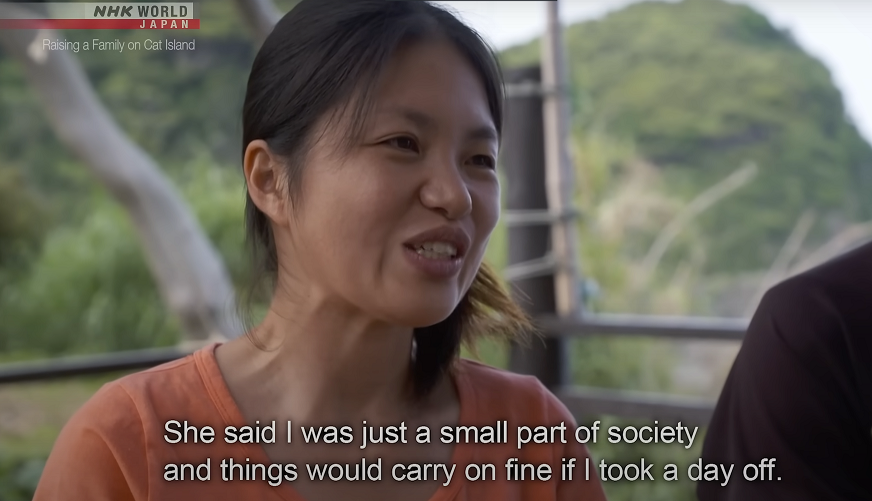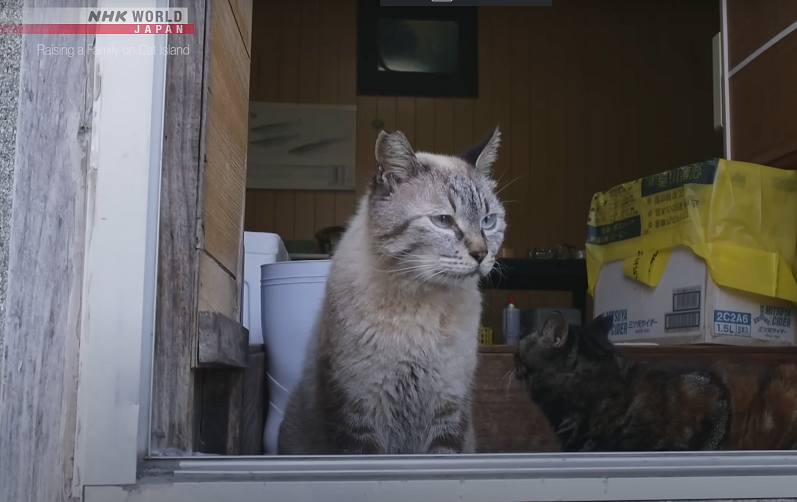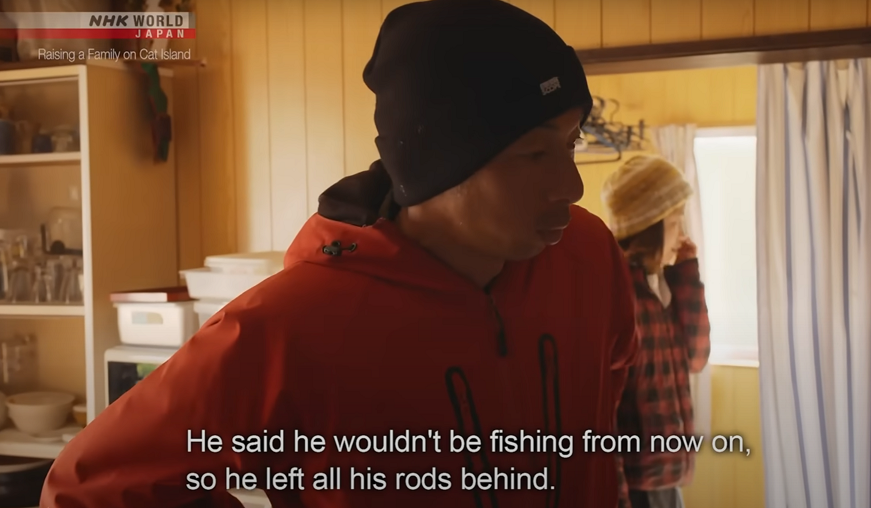Fukashima Island, also known as Cat Island, is home to more cats than humans. NHK World (Japan) released a great documentary about the island and its inhabitants titled “Raising a Family on Cat Island“.
Centuries ago, this island was a bustling fishing village. Today, less than 20 people remain, and their numbers continue to dwindle each year because of emigration or old age. Due to the lack of children staying in the island, the schools already closed decades ago, and children have to go to the mainland by boat in order to continue their studies.
In the entire island, only one family has children, the Abe family. Azumi (mother) and Tatsuya (father) raises the last two children left.
Fukashima became a tourist destination because of its large cat population. To serve its visitors, the Abe family runs the only café in the island. They are also building a hotel for tourists though not just as an income source. They wanted to immerse visitors more into island life by staying, and hopefully, decide to live there as well.
While the documentary covered the lives of the Abe family within the island, it also contained some thought-provoking dialogues about life.
Work and Purpose
Azumi worked for a supermarket after she graduated. She quit her job after two years because she could not find a sense of purpose from her work.
“Work often got too much and stressed me out.“, Azumi said. “Mother told me not to force myself to work.“
It is normal for people to give their all for their jobs, as our jobs and careers become part of our identity. But this has an unfortunate downside where we give too much of ourselves over something that doesn’t gratify us, resulting in chronic stress and eventually burnout.
As a counterbalance to this, Azumi’s mother reminded us to take a step back and look at our situation from the outside:
“She said I was just a small part of society and things would carry on fine if I took a day off.“

It is a good feeling to know that other people depend on us. It makes us feel important, respected, and (for some) powerful. Relying often on this feeling is a double-edged sword though, as it means we become more and more dependent on our work for this emotional crutch. The trap springs, and it becomes difficult for us to extract ourselves from it. In the end we are the ones who trapped us in the cage in the first place.
My first reaction was, “That makes sense, I should not be taking work too seriously and learn to let go sometimes“. But Azumi’s reaction surprised me: instead of leaning back at work, she leaned forward, albeit to a different direction.
“That actually made me want to live in a place that needed me, that couldn’t get along without me.” For her, having her work not depend on her is something that is unacceptable. If this job isn’t her purpose in life, then she will do her best to work on something (or someplace) that is.
Relationships
Personal relationships are very important, but this importance is amplified especially if you live in an island. There are only a few people in the community, so having good relationships with each other offer not just companionship, but the stability of the entire community depends on it.
When someone had a good haul after fishing in the sea, the fish are shared with the rest of the community. Work is also shared, especially when preparing for festivals. Activities such as preparing food, creating decorations, or participating in rituals, are done by the community as a whole.
But sometimes, these relationships can be strained. When Tatsuya’s parents visited the island to help with the hotel construction, his mother shared some wisdom about relationships.
When asked about life, she said: “Life to me is like the ocean. There’s calm days, and there’s heavy weather.“
“People are the same.“
Death
Mitsuru stayed on the island for 20 years so he can live his dream of being a fisherman. He is also responsible for keeping the beach clean by picking up washed up trash and debris every morning.
But as he got older, he developed more health problems. He has difficulty breathing that sometimes prevented him from going outside and interacting with the others. As the island cannot support his treatment due to lack of facilities, he has no choice but to go back to his hometown of Osaka.
He grew fond of a certain cat named Chamu. This is a cat that he knew for many years in the island. Chamu, while a good and gentle cat, is now old. Mitsuru is worried about what will happen to the cat once he leaves the island for good.

One day, Chamu went missing, as cats usually do when they know they are dying. A few weeks later, Mitsuru left the island as well to go back to Osaka.
As Mitsuru left the island that he loved and called home, he also left the life that he knew. He entrusted his house and his belongings to Azumi and Tatsuya. His most precious things, all his fishing rods, was also left behind. The life he knew for decades, now sits in his (now empty) home.

As Azumi inspects Mitsuru’s home, she remembered Chamu. “People have the same problem.“, she said.
“Do we want to hang on longer but spend our last years in hospital among strangers?”
“Or die naturally here on the island, cared for by friends and family?“
“I don’t know which is better.“